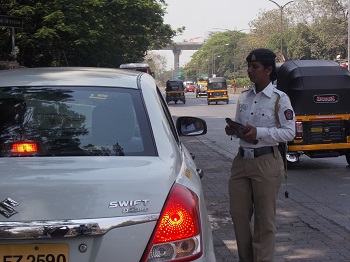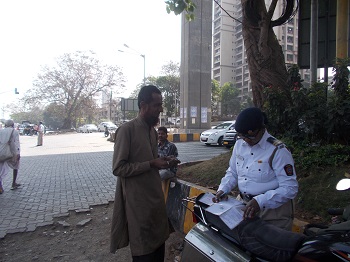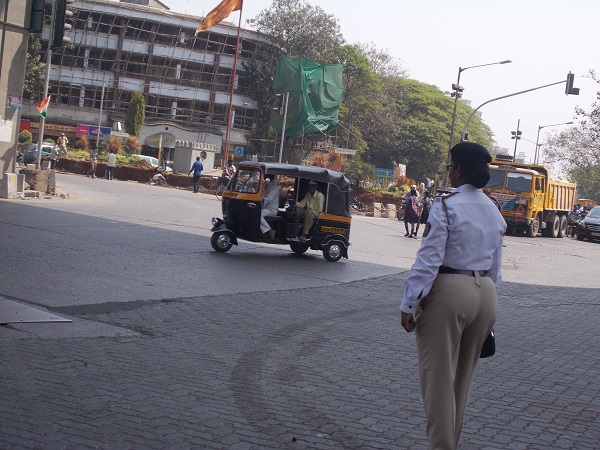Two traffic policewomen talk about their jobs, how citizens pose many challenges and why a little respect would be nice.
by Nidhi Qazi
Part 4 of the ‘Women’ diaries
It’s a normal day. Commuters are going to work. Vehicles are inching ahead of others to reach their destination as fast as possible. There is heavy traffic at junctions.
And there is the traffic cop stopping commuters who have broken the road laws in some way. Further down the road, there is a woman officer stopping vehicles, checking licenses, issuing penalty receipts. But wait. Within a few minutes, a driver breaks the signal and rushes past in a jiffy despite the woman constable’s stopping him.
 “Many a times, we women are not taken seriously. People break the rules often when they see a woman traffic cop,” laments Madhavi Naik (name changed), a head constable at a junction in one of the central suburbs of the city. Madhavi’s day starts at 7 am and lasts till 3 pm, and she is on the roads for all that time. She adds that the job has its challenges like all other jobs; but as a woman, it’s the perspective of people around that is the most challenging.
“Many a times, we women are not taken seriously. People break the rules often when they see a woman traffic cop,” laments Madhavi Naik (name changed), a head constable at a junction in one of the central suburbs of the city. Madhavi’s day starts at 7 am and lasts till 3 pm, and she is on the roads for all that time. She adds that the job has its challenges like all other jobs; but as a woman, it’s the perspective of people around that is the most challenging.
“People still feel that the police force is best suited to men. Though my family is supportive, my husband takes care of children, packs their tiffin, drops them to school…but society still questions my choice of job and feels, ‘Aurat kya handle karegi traffic, kaise kaam karegi’”.
An aside here: when I was chasing this story, my request for an interview was turned down several times by the women, saying, “Hum kya baat karenge, humein permission nahin hai. Aap bade sahab ya kisi male constable se baat karo.” Nevertheless, I was able to hold clandestine conversations, albeit, faced with risks of getting caught!
Coming back to the women traffic police, what is a typical day in their lives like? “On a daily basis, we regulate traffic, ensure smooth movement for preventing accidents, penalise those who violate rules and also, at times, when traffic signals are not functioning properly, we inform the companies to look into the matter,” says Smriti Desai (name changed), a head constable at a Bandra junction. But performing these duties is easier said than done, as the traffic police face problems at both the micro and macro level. As Smriti puts it, “How do you ensure that people don’t violate rules when they don’t know the rules in the first place? Worse, they are not ready to accept that they have violated the rules.”
Madhavi says, “Out of, say 100 commuters, there are only two or three commuters who will accept their mistake and instead of arguing with us, actually pay the fine. We are humiliated almost every time but now we are all used to it. On a usual day, if you catch a commuter, he or she will either argue endlessly and say things like “Aap uniform ka faayda utha rahehain, humari koi galti nahin hai.” But Madhavi and her colleagues have learnt to laugh such allegations off.
The big picture is also a worrying one. “Over the years, the number of vehicles has grown but the width of the road remains the same. Moreover, whatever spaces exist are also  taken up by vendors who come to Mumbai in search of livelihood. It is on these roads that the traffic police have to run the show,” says Smriti.
taken up by vendors who come to Mumbai in search of livelihood. It is on these roads that the traffic police have to run the show,” says Smriti.
According to traffic police, around 300 to 400 vehicles get registered in a day in Greater Mumbai. The traffic police also laments the under-utilisation of the BEST bus transport.
Further, since there is a manpower crunch in the RTOs (Regional Transport Office), this gap provides an opportunity for agents. “People lack awareness about rules, also because they get their licenses made with the help of these agents and thus, they needn’t pass the driving test. There are no checks undertaken by the license-issuing authority – how does anyone know if the applicant is eligible to drive?” asks Smriti.
Citizen consciousness, or the lack of it…
“From traffic rules to traffic itself, it is the citizen’s attitude which really matters,” feels Madhavi.
She raises further concerns: “Why don’t pedestrians use the skywalks which are meant for their safety? Why can’t people use public transport or carpool if they are going in the same direction? Why do commuters not talk to us properly? We are public servants and thus deserve some basic courtesy and respect. For us, the women, it is worse. Even women defaulters look down upon us and feel that we are intentionally insulting them by penalising them.”
But all this said, these women also feel that they are respected and given total co-operation by their male counterparts. “There are days when I feel, ‘Why am I doing this job?’ Then I feel proud about being a public servant, a part of this system,” says Madhavi.
Though citizens need to take precaution, be better aware of rules, and the pedestrian’s sense of judgement needs to improve, these women also feel that they, as police need to engage with the younger generation on three pillars of road safety – Education, Enforcement and Engineering.
Meanwhile, a little respect, please?
The Women’s diaries celebrate the spirit of women on the occasion of International Women’s Day on March 8 every year. Look out for Part 5 next: ‘Does gender equality exist in Mumbai?’
(Pictures courtesy Nidhi Qazi)
